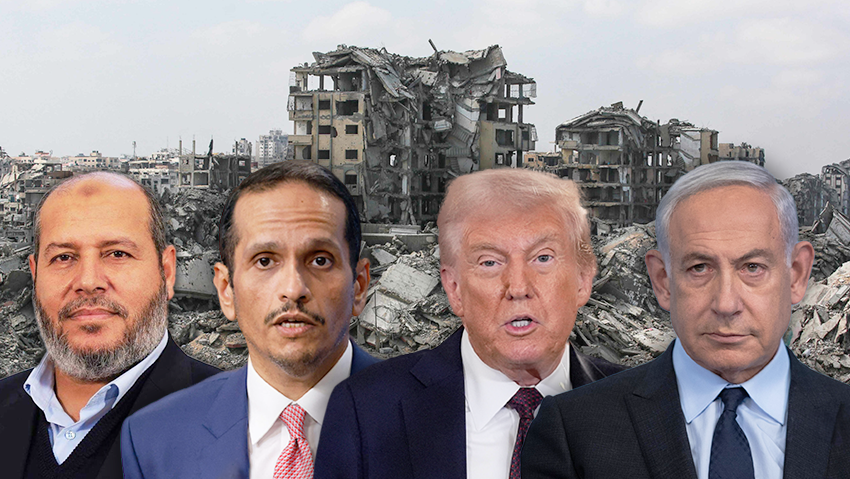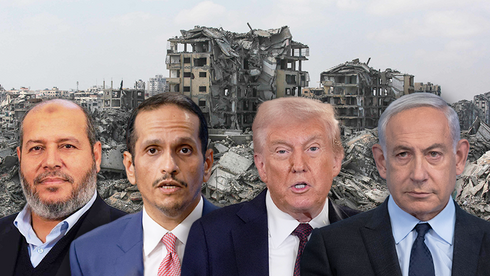According to sources familiar with the matter, expectations are that Hamas will avoid outright rejection, opting instead for a conditional acceptance that could prolong negotiations. The Qatari prime minister, Mohammed Al Thani, hinted at this possibility, describing the plan as a set of principles requiring clarification and further discussion.
2 View gallery


(Photo: Bashar TALEB / AFP, Ludovic MARIN / AFP, Alex Kolomoisky, AP Photo/Alex Brandon)
“There is still no clarity on the timeline,” one official said, adding that political approval procedures in Israel will not begin until Hamas says “yes” in principle. Only then will an Israeli delegation travel to Doha to begin detailed talks.
Officials say the plan includes complex security arrangements, such as phased IDF withdrawals, limits on intelligence-gathering and questions regarding future force deployments. “The IDF would remain on the ground in Gaza and withdraw gradually, a process that will be highly complicated,” one source noted.
While the military aspects are still under review, officials also flagged concerns about the political and humanitarian components. Trump announced plans to establish a “Peace Council” chaired by him, with former British Prime Minister Tony Blair among its members. The initiative envisions a future multi-national peacekeeping force, possibly including troops from the United Arab Emirates, Saudi Arabia and Azerbaijan – though no formal commitments have yet been secured.One of the most contentious points remains the issue of Palestinian security prisoners. Jerusalem has ruled out releasing high-profile figures like Marwan Barghouti, but with about 280 Palestinians serving life sentences in Israeli prisons, officials worry that nearly all could be released as part of a final deal.
“There are elements here that could lead to a very difficult political debate,” one Israeli source acknowledged. Prime Minister Benjamin Netanyahu will be required to bring the agreement to a vote in the Cabinet and government. He is expected to secure a majority, though not without resistance from members of his right-wing coalition.
The potential backlash was underscored Tuesday by National Security Minister Itamar Ben-Gvir, who sharply criticized the plan during a Cabinet meeting. “This agreement endangers Israel’s security,” he said. “It is riddled with holes, undermines the war’s objectives, pulls the IDF out of operational control in Gaza and entrusts Israel’s defense to third parties. It grants pardons to Hamas murderers. It’s simply inconceivable.”
In the meantime, officials say possible scenarios for Hamas include partial or full acceptance or outright rejection. Should Hamas agree, the plan envisions a phased ceasefire tied to the deployment of Arab or international forces in Gaza. The implementation process could take weeks or even months.
A conditional agreement could also unlock humanitarian relief for Gaza, including partial reopening of crossings, delivery of aid and limited infrastructure reconstruction. Still, officials stress that “everything hinges on Hamas’ response.”
Trump warns Hamas: Respond in days or face consequences
(Video: C-SPAN)


Meanwhile, IDF Chief of Staff Lt. Gen. Eyal Zamir visited southern Gaza on Tuesday alongside Southern Command chief Maj. Gen. Yaniv Asor, Chief Military Advocate Maj. Gen. Yifat Tomer‑Yerushalmi and other senior officers. During the tour, Zamir said, “We will continue to maintain alertness, be ready on defense lines and act offensively to achieve security and victory.”
He convened an operational briefing with commanders and troops, saying the military is operating “in a unique reality, in a historic war and at a significant crossroads. The war continues. The courage of fighters and commanders in all sectors, especially in Gaza, is creating new opportunities and drawing us closer to achieving war objectives.” He stressed that the IDF would provide the political leadership the flexibility to make decisions in conducting the campaign.
“I devote much attention to the October 7 investigations; we must not underestimate the enemy,” he added. “All IDF capabilities are harnessed and working for the fighters on the field. All branches are doing everything to make sure you lack nothing. To achieve our goals – returning the hostages, defeating Hamas and increasing damage to its capabilities – I am very impressed by your activity in Gaza. I have deep respect for you and for the fighters, and we must maintain vigilance and ironclad patience for what comes next.”
Earlier Tuesday, U.S. President Donald Trump sent a message to Hamas, giving the group three to four days to respond to his Gaza proposal. “We’re waiting for Hamas to respond. If it rejects the offer, Israel will do what it needs to do,” he told reporters as he departed the White House, saying there is “not much room” for further negotiation.

